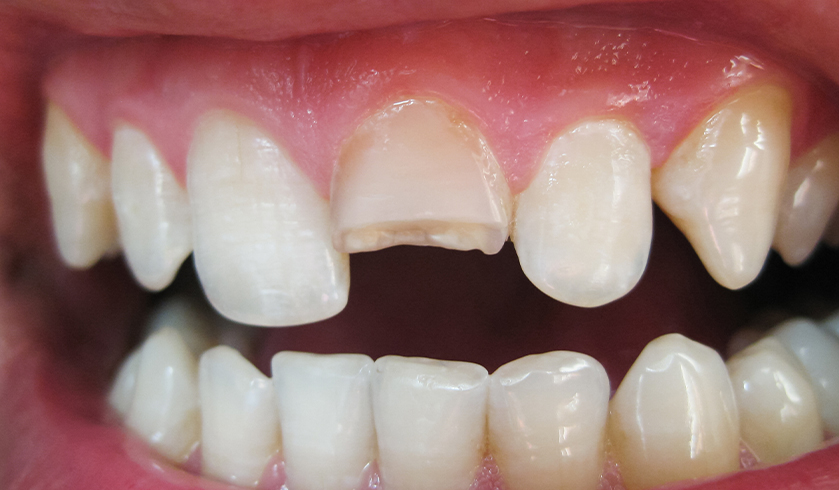Dental veneers are ultra-thin tooth laminates made of white composite resin, porcelain or ceramic material. They are bonded by dental cement or resin to cover the front tooth surface, improving dental structure and appearance. Individuals choose dental veneers or Lumineers for teeth whitening, smile makeovers, teeth alignment and restoring damaged teeth.

Dental Veneer Durability and Damage Prevention
Dental veneers are made of different materials such as white composite resin, ceramics and porcelain. The durability of these materials will differ.
The durability of dental veneers also depends on their care, the individual’s oral hygiene and their dedication in attending dental veneer appointments. Some dental veneers are expected to last within a timeframe of one to two years or be replaced after ten to fifteen years.
Dental veneers do need to be replaced after this expected time period. Following dentist recommendations for maintenance of dental veneers ensures longer durability. Seeking immediate dental care for damaged veneers will prevent accumulated damage and help wearers have white, healthy teeth in the shortest time.
People benefit from dental veneers which form part of tooth structure and create a brighter smile. Self-image and confidence improve, particularly when attending special occasions or events, business meetings and social scenes. Dental veneers are used to treat discoloured or stained teeth, chipped or worn teeth, irregularly spaced teeth and mildly misaligned teeth.
Teeth are easily damaged through teeth grinding habits, unhealthy lifestyles and unbalanced diets. Foods and drinks including coffee, tea and red wine can stain or discolour teeth. Dental veneers are white in shade and used to reshape irregularly formed teeth into a natural, straight and healthy set of teeth.
Sporting activities may result in chipped and damaged teeth. Dental veneers may also become damaged through contact sports, injury and teeth grinding. Wearing a mouth guard may preserve existing teeth and dental veneers.
When dental veneers become damaged or broken they detract from their treatment purpose, reducing self-confidence and well-being. Dental veneer treatment and dental veneer repair or replacement aim to restore dental function and appearance.
Due to the different types of dental veneers, materials and associated care requirements, veneer damage and restoration techniques may vary. Dentists evaluate patient’s oral health, treatment suitability and the condition of dental veneers during a dental examination.
When custom-made veneers are first made for a patient they are created in a dental laboratory from an oral impression. Some dentists use CEREC technology to make personalised dental veneers that suit the individual. This advanced form of technology may also be used to restore damaged dental veneers.
Local anaesthetic may or may not be required for teeth preparation and fitting of dental veneers. Certain veneer types and procedures involve teeth etching while others may not. Dentists ensure dental veneer preparation and fitting is pain-free and comfortable for the patient.
In some cases, individuals may be provided with temporary veneer replacements while they await their new or repaired veneers for a one to three week period. Some dentists provide same-day smile makeovers with dental veneers. Others send the patient measurements attained from dental moulds and imaging to an external laboratory for dental veneer production.
Dentists strive to match the veneers to the shade and shape chosen by the individual. Whether selecting new veneers or having veneers repaired or replaced, individuals have choices in materials, shape and shade so that their veneers give them the feel and look they desire. Many dentists now offer patients 3D visualisation options so they can see before and after results of wearing dental veneers.
During the fitting of dental veneers the tooth surface may be textured with a gel before dental cement is applied to fix the veneers in place over existing tooth structure. A curing light may be used to activate and accelerate the bonding process. The tooth is then cleaned and polished for a pristine, natural look.
When dental veneers either fall off or become loose or damaged, it is best to try and save the veneer. Phone for an appointment and take the veneer with you immediately to a dentist for re-fitting or restoration. Our clinic provides a 24 hour emergency service for dental care.
The dentist will assess the veneer for damage and re-fit it where appropriate. Although self-repair or bonding is a temporary option it is recommended that the veneer be assessed by a dentist so the best results may be achieved. Wearing damaged dental veneers detracts from the smile and may cause complications.
Dentists consider how long an individual has worn their veneers, the type of veneer and the teeth they are bonded to when recommending veneer restoration or replacement. Early care for damaged veneers can prevent the need for more extensive repair.
Accessing Dental Veneer Care
Get in touch with our clinic by phone or email and a member of our friendly team will provide you with further information about dental veneers, choices in dental veneer types, dental veneer care and repair.
Get in touch